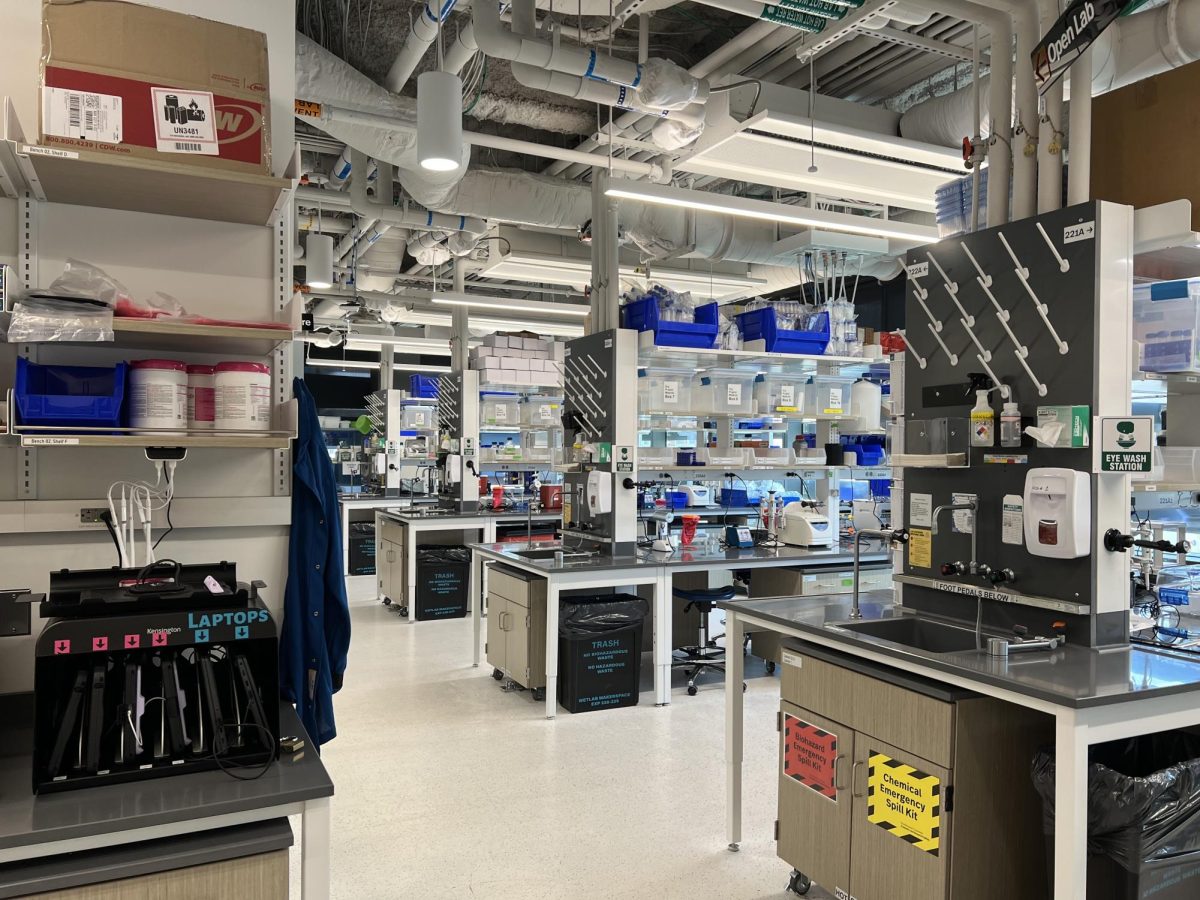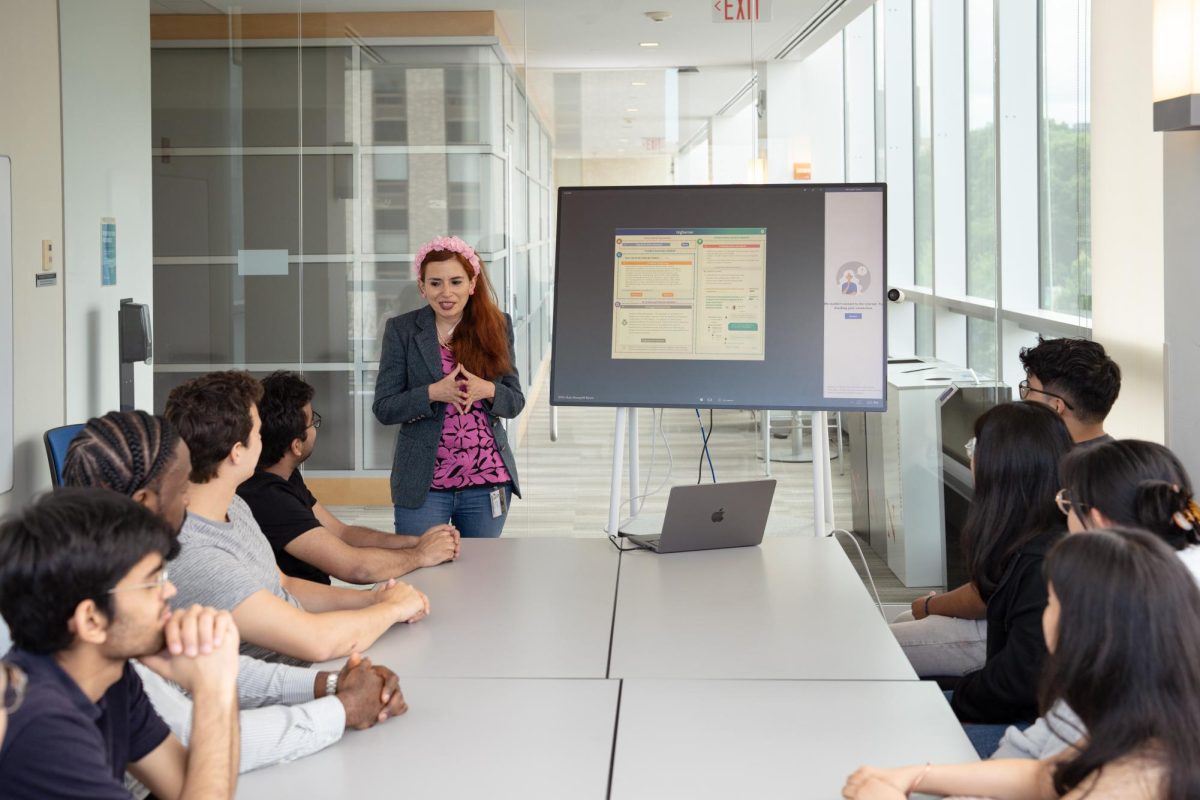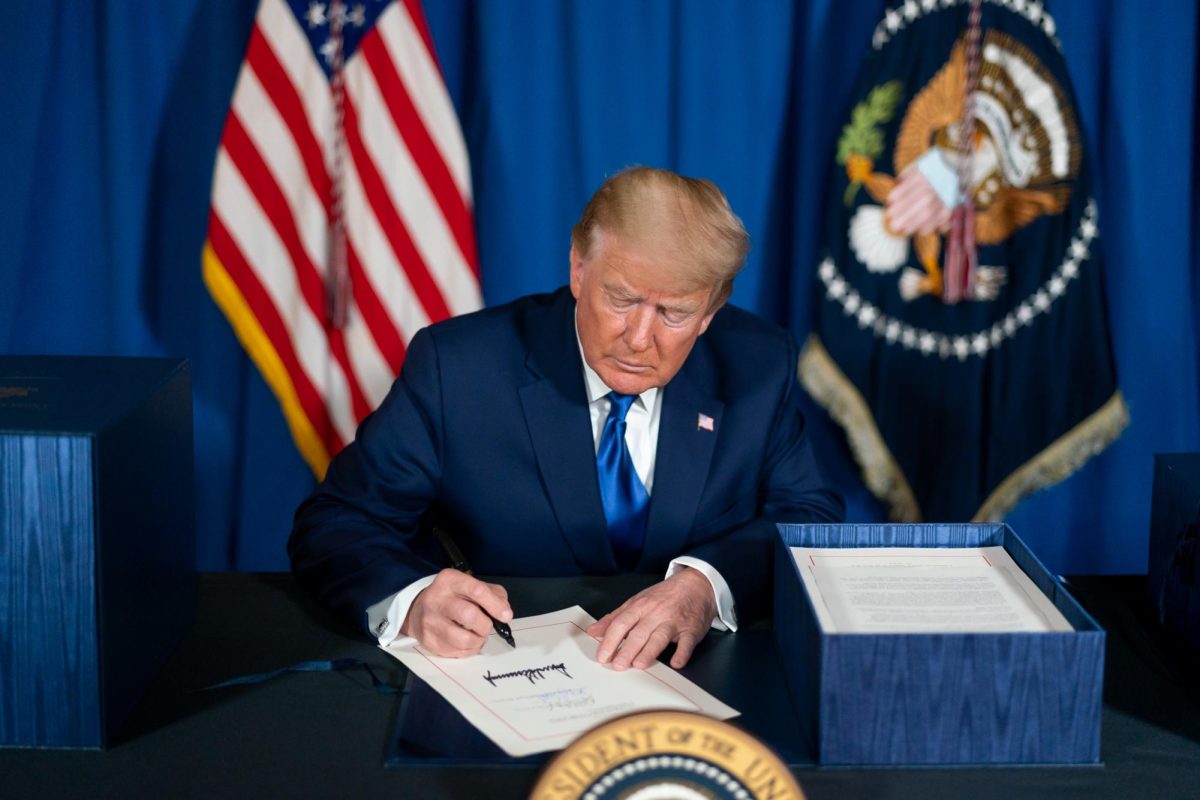
About 200 environmental activists and concerned community members gathered with signs and leaflets in Blackstone Park in the South End on July 28 to rally against Boston University’s proposed biosafety level four laboratory. The facility, to be constructed on Albany Street, will be less than two miles from Northeastern.
Volunteers passed out fliers to the crowd as they lined up in the park and began to march from the corner of Washington Street and East Brookline Avenue to the future site of the laboratory.
Also within the crowd was a large puppet held by several volunteers courtesy of the backbone campaign, a grassroots organization designed to “embolden the Democratic Party.”
Protesters were questioning the goal of such a potentially dangerous facility in an urban neighborhood. Boston University obtained permits in the fall to build the structure, which is set to break ground in the spring.
“The goal of the building of these labs is to have the facilities we need to do the research required to protect the country against bio terrorism,” said Rona Hirschberg, a senior program officer at the National Institute of Allergy and Infectious Diseases (NIAID).
According to a document from the NIAID called “The Need for Biosafety Laboratory Facilities,” there has been an increase in the need for more level four facilities, like the one BU is proposing, because of recent bioterrorist threats. The level four laboratory, which is the highest-level security lab, would have the capability to research anthrax, smallpox, the Ebola virus and the plague.
“There is no way it makes sense to put this in a city,” said Elizabeth Skidmore, a resident of Roxbury at the rally. “All other level four labs are in unpopulated areas.”
Students on campus feel similarly about such a facility being built in Northeastern’s proverbial backyard.
“Why on earth would they put that there?” said Katie Schmaling, a junior history and education major. “I think they could do something like that where they could put it farther out [of the city].”
Community groups in the South End and Roxbury areas, Safety Net and Alternatives for Community and Environment (ACE), have been working against the construction of this facility since the announcement in September that BU’s biosquare, or medical campus, had been chosen as its location.
Although the construction site is located near existing Boston University Medical Center buildings as a measure of convenience, some rally participants said they feel putting the lab in the South End/Roxbury area comes down to an issue of race.
“It’s environmental racism,” said Tomas Aguilar, media coordinator of ACE. “You don’t see the lab being proposed for the Board of Trustees’ communities because they would be demanding all the information so they can make an informed choice.”
One of Aguilar and ACE’s biggest problems with the lab is the lack of information getting to the community. When receiving some information they requested, pages were missing and parts were blackened out, Aguilar said.
“The community should be deciding if something this dangerous were in the neighborhood,” Aguilar said. “The community wants to decide and have a voice in this.”
Some people view this facility as more of a terrorist threat, rather than a tool to combat bioterrorism.
“That’s definitely a terrorist threat,” said Nareg Doghramadjan, a sophomore mechanical engineering major. “I would not feel as safe as do I right now [if that was built].”
Aguilar stressed the danger the lab would put the community in and how desirable the site would be for terrorists.
“All it takes is an outbreak to be released into the community and then what?” Aguilar said. “It’s an inviting target because [bioterrorists] don’t have the capabilities to build these weapons in their basements, but the easiest way to get them would be from the labs.”
Ellen Berlin, a spokeswoman for BMC, said safety and security would be at the forefront of the design and management of the lab.
“We will be using sophisticated and technologically up-to-date systems to ensure safety and security,” Berlin said. “The building design includes redundant systems, special filters and secure barriers to determine who goes into which area, including an iris [eye] scan.”
Berlin also mentioned the “two man room,” which makes it necessary for two people to retrieve chemical agents, in case one may be a saboteur.
Some students feel the best safety measure against a terrorist threat would be to not put the lab in the city in the first place.
“It’s a terrorist threat,” said Greg Waldman, a junior international affairs major. “It should be isolated in the country side.”
Another concern of local residents is how the chemical agents will be transported to the laboratory. Typically they have been transported via major shipping companies like UPS and FedEx.
“They’re bringing dangerous materials into city streets,” said Evelyn Kimber, a South End resident.
However, Berlin said there are major precautions they are prepared to take to safely transport the dangerous microbes.
“There will be special carriers trained to handling these agents and certified by virtue of a background check,” Berlin said. “We’ll also be using [Global Positioning Systems] to know where they are at all times. Deliveries of agents will all be expected so the facility will be prepared to accept it. We’re working on a plan so it will not have to travel on city streets.”
Since much of the funding for this project is coming from the federal government, community members are questioning who will be in control of what will be studied at the lab. However, the BMC said Boston University would regulate the research at the facility.
“Boston University will own, manage and operate the laboratory. They evaluate the proposals and evaluate the research,” Berlin said. “The government will provide oversight to make sure the facility is doing what it is meant to do — develop agnostic vaccine treatments for emerging diseases whether they occur naturally or are introduced as agents of bioterror.”
Steve Brehio, the associate director for environmental health safety at Northeastern, said no matter where the lab is located, security measures and protocol will have to be in place.
“I don’t see any issue with this being in the center of Boston,” Brehio said. “Whether it’s in the center of Boston or the plains of Nebraska, they’re going to need security oversight to manage a facility like this properly.”
In addition to major safety concerns from the community, City Councilor Chuck Turner, who opposes the construction of the lab, is worried it may ruin the blue-collar work base in the area.
“The area around the lab has a number of small businesses that provide 15,000 blue collar jobs, 10,000 of which are held by Boston residents,” Turner said. “The presence of the bio lab will bring pharmaceutical companies into the areas near to the lab and very well could lead to the demise of small businesses.”
Jessica Shumaker, a spokeswoman for the Boston Redevelopment Authority, said the lab will open up job opportunities in the area including 1,300 construction jobs with a goal of at least 50 percent of those jobs going to Boston residents. The lab itself will offer about 660 jobs at all levels, not just high-level research.
For many nearby residents, the positives don’t seem to outweigh the negatives, and as BU plans on breaking ground on the lab next spring, both proponents of the lab and anxious residents prepare to continue the war over their safety.
“This would not make us more secure, it would make us less secure,” said Cynthia Peters, a resident of nearby Jamaica Plain. “This is not a war on terror, it’s a war on us.”








